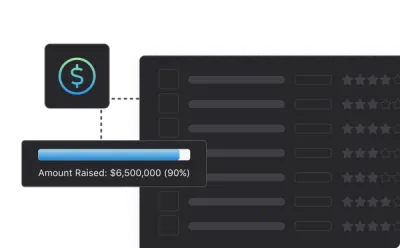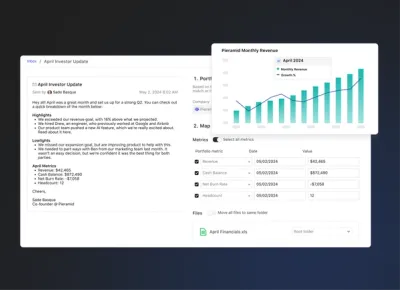
Startups are in constant competition for 2 resources — capital and talent. Without capital, a startup will fail to grow and execute plans. For startups just getting off the ground or ones that have yet to find product-market fit, securing capital via customers can be difficult.
However, there are countless places (angel investors, venture capitalists, private equity, friends and family, etc.) to look for capital to help you and your startup secure the money you need to develop a product, scale revenue, hire top talent, and more.
Related Resource: How to Find Venture Capital to Fund Your Startup: 5 Methods

Learn more about how you can find and attract different types of private investors in our guide below:
What is a Private Investor?
A private investor is an individual or firm that provides financial backing for startups or businesses. There are varying levels of private investors. There are established venture capital and private equity firms that make a living privately investing in companies. On the flip side, there are wealthy individuals and angel investors, who are investing in small startups as a way to diversify their investments.
Related Resource: How to Find Investors
The Ins and Outs of Private Investing
A private investor is a generally broad term. Private investors can come in all shapes and sizes and might be already in your network but you may not know it. Different private investors function in different ways.
Related Resource: A User-Friendly Guide on Convertible Debt
Types of Private Investors
Learn more about the different types of private investors and what the benefits of them investing in your startup are below:
Angel Investors
As Investopedia puts it, “An angel investor (also known as a private investor, seed investor or angel funder) is a high-net-worth individual who provides financial backing for small startups or entrepreneurs, typically in exchange for ownership equity in the company.”
Angel investors are generally wealthy individuals looking to diversify their investment portfolios. Because of this, financial returns are not their sole motivator. Angel investors might invest at a more personal level — e.g. a company might be in a space they are interested in, the founder could be a friend, etc.
There are a number of benefits of finding angel investors to invest in your startup. To start, there are likely angel investors in your immediate network that you might not be aware of. As they are generally a friend, family member, or someone in your network, the fundraising process tends to be less stringent and can move along quickly (however, because of this check sizes tend to be smaller).
Related Reading: How to Effectively Find + Secure Angel Investors for Your Startup
Related Reading: Types of Venture Capital Funds: Understanding VC Stages, Financing Methods, Risks, and More
Venture Capitalists
Venture capital is the private investor most founders tend to be most familiar with. As defined by Investopedia, “A venture capitalist (VC) is a private equity investor that provides capital to companies with high growth potential in exchange for an equity stake.”
Venture capitalists are professional investors. Venture capital firms have their own investors, Limited Partners, to who they need to return outsized returns to. Because of this, what they are looking for in an investment might vary from what an angel investor is looking for in an investment. Their thesis and investing principles likely come down to their ability to flip a huge return for their LPs.
Related Reading: Understanding Power Law Curves to Better Your Chances of Raising Venture Capital
However, the benefits of raising from venture capitalists can be huge (if venture capital is right for your business). Because of the growth in the venture capital space, there are more investors than ever before. This has created increased competition and the need for VC firms to offer more than capital. VC firms now offer to help with hiring, strategy, product development, leadership, fundraising, and more. When leveraged correctly, venture capital can be a great tool for a startup that believes it can grow to a massive valuation.
Related Reading: All Encompassing Startup Fundraising Guide

Private Equity Firms
According to Nasdaq private equity firms are, “Firms that use their own capital or capital raised from investors to take companies private with the aim of running them better and later taking them public or selling them at a profit.” While venture capital is a form of private equity — VC firms generally spend their time and money investing in earlier-stage companies. Private equity firms are generally geared towards later-stage companies.
Because of their focus on later-stage companies and straddling the line between public and private companies, private equity firms can offer some major benefits. The largest benefit is liquidity for founders and early employees. PE firms will generally acquire companies that free up capital for any previous investors, founders, and team members.
Related Reading: The Understandable Guide to Startup Funding Stages
Where to Find Private Investors?
Naturally, the next question is “how do I find these private investors?” Luckily over the last few years different resources and communities have surfaced to help founders find the right investors for their business.
- Visible Connect — Connect is our free and open-sourced database of venture capitalists. We verify the data with investors directly so it is the most up-to-date, accurate, and important data for founders.
- AngelList — AngelList is a great tool for finding angel investors and syndicates for your startup.
- Online Communities/Twitter — Different online communities (on Discord, Twitter, etc.) exist and are full of eager angel investors and early-stage VCs that can be a fit for your business.
Related Resource: How Startups Can Use an Investor Matching Tool to Secure Funding
How to Network With Private Investors?
Raising capital from private investors is a numbers game. You’ll need to talk to countless investors to find the right investor for your business.
At Visible, we like to compare fundraising to a traditional B2B sales process. You are filling the top of your funnel with qualified investors, nurturing them throughout the middle of the funnel with communication, and hopefully closing them and cashing a check at the bottom of the funnel.
Just like a sales process, there are different methods for networking and filling the top of your funnel:
- Warm Introductions — Oftentimes the best place to start is with your immediate network. By combing through LinkedIn and your personal network look for anyone that can make an introduction to one of your dream private investors.
- Cold Outreach/Email — When you can’t find a warm introduction, don’t be afraid to send off a cold email. Related Resource: 3 Tips for Cold Emailing Potential Investors + Outreach Email Template
- Events — The startup world is a typically tight-knit community. VCs, angels, and PE firms spend time at events to find deal flow. Attend events and speak with as many qualified investors as possible.
- Twitter/Social Media — Private investors, especially VCs, spend time building their personal brand on Twitter. Interact with their Tweets and build a relationship using the tools already available to you.
By approaching your fundraise like a sales process you’ll be able to uncover the best methods for networking and building relationship with investors. Check out our Fundraising CRM and tools to track and manage your next raise.
Related Resource: 7 of the Best Online Communities for Investors
Related Resource: 6 Helpful Networking Tips for Connecting With Investors
Related Resource: A Complete Guide on Founders Agreements
Key Concepts Private Investors Look For in Startups
Finding and networking with the right investors is only a small piece of the puzzle. At the end of the day, you need an investable business that excites private investors. A few of the key concepts they look for.
Related resource: Dry Powder: What is it, Types of Dry Powder, Impact it has in Trading
Increasing Revenue
No matter how you cut it, a business needs to have increased revenue to be investable in the eyes of a private investor. If you’re revenue (and profit) and are not increasing, they likely won’t make money on their equity investment in the future.
Liquidity
Typically speaking, investing in startups is illiquid and can be risky for private investors. Clearly communicate this but also make sure to have a clear plan for successfully exiting at a later date.
A Clear and Concise Business Plan
If you can’t clearly articulate your business plan, strategy, and go to market efforts, investors will be left confused and likely not have conviction in your business. Be sure to clearly lay out your model and use any historical data to demonstrate how and why your plan is working.
Controlled Spending Behavior
In the eyes of an investor, they are cutting you a check and you are at liberty to spend it however you’d like. Investors need to trust that you’ll responsibly spend and budget your new capital. Demonstrate that you have a clear plan, historically have controlled your spending, and have unit economics that will scale.
A Big Market
As we previously mentioned, private investing generally follows a power law curve. Private investors are looking for some massive exits in their portfolio as most startups fail. Show potential investors that you are operating in a potentially big market that can create huge returns in the future.
Related resource: 13 Generative AI Startups to Look out for
Successful Team
Startups, especially in the early days, are largely driven by their team. For companies that are pre-revenue, investors will spend time closely evaluating the founders and team members to build conviction on their ability to solve the problem and build a business.
Strong Unit Economics
Scalability and strong unit economics will be a huge plus in the eyes of investors. Show investors, you have strong unit economics and a model that will scale nicely as you grow. Learn more in our post, Unit Economics for Startups: Why It Matters and How To Calculate It.
Your Funding Journey Starts With Visible

Finding the right funding for your business is a journey. As you begin to scale your company, remember that different funding options exist and can be leveraged to best help your business.
If private investors are not the right option for your business, great! If you want to kick off a fundraise and find the right angels and VCs for your business, awesome! We can help founders find the right investors, manage their conversations, share their pitch deck, and update potential investors. Find the right investors for your business with Visible Connect — Give it a try here.
Related resources:




